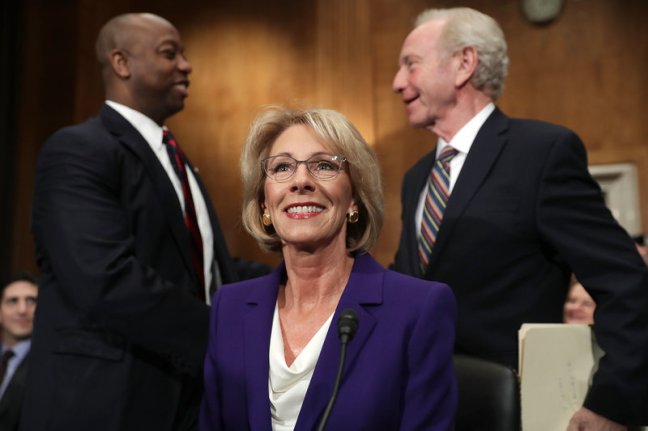 The slightly-cranky voice navigating the world of educational “reform” while trying to still pursue the mission of providing quality education.
The slightly-cranky voice navigating the world of educational “reform” while trying to still pursue the mission of providing quality education.
Source: CURMUDGUCATION: Foggy College Readiness
Foggy College Readiness
National Affairs includes Finn in their Winter 2017 issue with “The Fog of ‘College Readiness’.” It’s a piece that wants to set off some alarms, but actually has some serious fog problems of its own.
Finn opens by saying that maybe more than half of graduating high school students are not ready for college– according to “some estimates.” This is a problem because the “vast majority” of high school students plan to attend college. This is a very foggy place to start; I teach a Pretty Large Number (to use Finn’s style of metrics here) of students who are the future welders, auto mechanics, body repair experts, home health care aids, and heavy equipment operators of America. None of them intend to go to college, and none of them need to (and in my English class, my goal is not to prepare them for college). So to summarize our starting point– some number of students aren’t ready to go to college, and some number of those students actually want to go to college.
So how does Finn think we arrived at this foggily-delineated problem?
The source of this gap between belief and reality is the K-12 education system. Our schools create a fog when it comes to academic preparation for college success. Concerned more with inclusiveness, validation, and graduation than with college preparedness, administrators encourage teachers to, for instance, consider pupil effort in their grading, and push students to take advanced courses for which they have the ambition but not the readiness.
He devotes a paragraph to Hillary Clinton’s free college ideas (leading me to believe that this piece was wrapped up before, say, mid-November) and then notes that while ambition and optimism are swell things, there just comes a point–
But at a certain point, encouragement becomes damaging.
K-12 schools and colleges and universities should stop lying. It’s an interesting position because it points in a direction that Finn never suggests or even hints at– the conclusion that some students just aren’t going to get that special level of success and they should start figuring out how to face the truth that there lives are not going to be all that great or successful. It’s the subtext of so much reformsterism– that some people are just destined for Better Things than other people, and we should stop trying to raise false hope and doomed aspirations for those other people, and we should most especially stop dumping money in a system that raises those false hopes and doomed aspirations. Instead of building Great Hope Academy, we should be offering Know Your Place and Be Happy High School.
But as I said, Finn isn’t going to go there, or even admit that such a there is implicit in his argument (of all the reformsters, only Finn’s successor at Fordham, Mike Petrilli, is willing to just say that some students are of a better type and therefor need a better type of school, away from the non-strivers).
So where does he go?
It’s no secret that possessing a college degree vastly improves one’s chances of attaining the “good life.” It helps greatly in the quest for a decent job, a living wage, upward mobility (if one’s parents had no such degrees), and full participation in American society. Indeed, a society full of college graduates is apt to be not just wealthier but healthier and more stable than one populated by dropouts and people with only K-12 schooling.
Well, no. Finn tried to muster some evidence for this by citing Coming Apart and Our Kids. But I’d argue what Robert Putnam shows in Our Kids is what is supported by other research– the best predictor of the Good Life is being raised by parents who have the Good Life themselves. A college degree is just one of those things that people on the Good Life track get; it’s an effect, not a cause. When Finn envisions a society full of these Better People, he’s not envisioning a society full of college grads so much as he’s imagining a world where more people are Better People from privileged backgrounds. Although he’s also imagining a society in which a lot of people might be cranky about being fast food managers and garbage collectors with college degrees and college debt out the wazoo. College degrees do not make college degree-requiring jobs appear, and they do not make laboring jobs disappear.
Finn rings the bell about disappearing lower-skills work, and that’s a fair point. We seem to be slowly figuring out that automation is a much a threat to our workforce as outsourcing. That means we need more college-educated folks, and Finn also wants to ring the bell of college remediation– which means that those students must not have been prepared to attend. To his credit, Finn lays some blame for this on the college’s choice to accept the student in the first place. I would love it if the right-tilted Finn recognized this as an effect of the free market on education– that if the market shrinks, the business must get fast and loose about whom it accepts as customers, and in this way, competition and free market pressures can actually lead to a worse product, rather than the high quality that free market acolytes believe must be the result of competition.
Anyway, Finn would be okay with the over-acceptance of deficient college freshmen if colleges were any good at remediation, but they aren’t. For this moment, at least, Finn and I are in agreement. Finn also notes that remediation is now part of the business model, which matches what I hear from former students.
So where is this terrible honesty gap sneaking in?
Finn names several culprits. Grade inflation, leading to lost of students getting Bs and As. Students getting scores that have incorporated things like hard work. Kids These Days, with their droopy pants and participation trophies.
But Finn is also unhappy with standardized tests, and he argues against norming because that ends up defining “fifth grade level” for readings as “about average for all fifth graders.” Finn wants standards– hard, tough, immovable standards that will give lots of students the failing scores they deserve. It is not clear what Finn thinks the standards should be based on– who exactly will decide what a fifth grader “should” be able to do. Nor does he mention that the modern emphasis on normed testing and rating and ranking is built into the dna of the reformster movement, which has repeatedly insisted that we need standards in order to compare students, teachers and schools, to sort out the winners and losers.
Oh, and look– coming out of the fog is this large piece of baloney. Finn believes despite the “furor” raised over the Common Core, “a welcome outcome of the recent round of improvements in state standards is that young people who actually master them will be prepared for college-level academics.” So wrong, in so many ways. Do the CCSS math and English standards guarantee that someone is ready to be a biology major or history major or music major? Is there a single solitary piece of evidence that the standards prepare someone to be a math or English major? And we’ve had the standards for years now– do we see a corresponding spike in college success? No, to all of that?
Well, Finn can explain the last part. Wimpy states have balked at setting honesty cut scores for tests because they don’t want to face the truth that huge swaths of students should be labeled deficient. And the primary and middle school grades sent home form the tests are “cagey” about whether or not students are on track for college. Because surely you can tell whether a ten year old is on track for college or not, and you shouldn’t be “cagey” about it.
Finn says that high schools add to the fog with things like lots of AP courses. As with many of his other complaints, Finn skips the part where he and his reformy friends have added to the problem. AP courses (which are a product sold by the College Board, the company that is now headed by David Coleman, architect of the Common Core) are widely added because in some states like mine, offering AP courses helps improve your school performance score.
Finn does note that pressure from all (feds, reformsters, etc) over has pushed schools to increase grad rates some way, any way, and he sees ties to the Go To College rate here. That creates pressure to finagle, which creates students and families who are lied to by “adults in the K-12 system,” none of whom will suffer any adverse effects for their duplicity. But teachers who give those As and Bs are like doctors who prescribe opiates.
There are all sorts of pieces lost in the fog of Finn’s portrayal. One piece is the students and families themselves. In thirty-some years, I have lost track of the students and parents who have chosen less rigorous coursework so that they could get higher grades or have less stressful lives. Give me control of those students’ educational choices and they would have been much more prepared for college– but that’s not how the system works. Every year I have at least one or two students in my non-college prep class who want to go to college, but don’t want to take college track courses, despite my explaining in no uncertain terms the mistake they’re making.
One proposed Finnian solution? Well, colleges could be honest and tell high schools “you can give a diploma to anyone you want, but they can’t come to college without evidence that they’re ready to do the work here.” Finn envisions a two-tier graduation system, with one track for Plain Old Vanilla Diplomas and one for Ready For College certificates. Colleges would be completely upfront about who could and could not gain admittance and which students would be denied the opportunity to pay tuition to the college and again I ask, has Finn ever met the Free Market?
I do think he’s on the verge of another realization here, which is that colleges and universities, as engines and markers of the regular old systems of privilege, often make admissions decisions that have nothing to do with academic promise. Can you imagine Yale telling George H. W. Bush, “Sorry, but your son George, with his lackluster high school performance and poor test scores simply isn’t Yale material, and he’ll have to go somewhere else because, you know, we have standards here. Also, can we count on your generous donation to the alumni fund again this year?”
This is also as good a place as any to note another giant gaping fogbank in Finn’s reasoning which has been typical at every step of the College Ready reformster movement. College Ready is not a single, measurable thing. Not even a little. “Ready to major in art history at Harvard” does not look remotely like “ready to major in biology at Penn State” which does not look remotely like “ready to major in Spanish at Outer Dipwillow Community College” which does not look like “ready to major in underwater basket weaving at Bob’s For-Profit Online University.” When Finn says that colleges should be frank with high schools about what students need to be admitted there, I am imagining a 300-page document from every single college in the country.
If Finn or anyone else wants me to take this College Ready baloney seriously (because I’m sure he’s losing sleep worrying about my approval), they should show me a specific list of exact skill and knowledge areas that they believe defines College Ready for all schools for all courses of study. It cannot be done. College Ready is not a thing.
Finn imagines the ripples that would spread if colleges implemented his policy of hard honesty:
If colleges stopped admitting sorely unprepared students — or Washington curbed their access to financial aid — there would be an initial uproar, with cries of discrimination, narrowed opportunity, and fresh barriers to social mobility. A number of colleges would lose enrollment and some — especially community colleges, but also some private colleges, including a number of “historically black” campuses — would shrink. At least a handful would likely close.
Yes, Checker Finn just said that if we tightened college standards, black students would be hit hardest.
Finn imagines that high schools would get a whole lot of pushback from parents who discovered that Junior was not doing well enough to get into college.
But those schools, too, need to be part of the solution, not just by preparing their pupils more effectively but also by advising parents — in those annual test-score reports, of course, but also in teacher conferences, quarterly report cards, and other bulletins — as to the kinds of colleges that their kids are or are not on track for.
Yeah, we could add new staff– we could call them Know Your Place counselors.
Somewhere in all of this classist mess is the notion that college is not for everyone, which is dead on, because there are plenty of rewarding, well-paid, and absolutely essential jobs that are necessary, as Mike Rowe sayd, “to make civilized life possible for the rest of us.” In fact, if folks like Finn want to help with this issue, one thing they could do is stand up for unions and advocate for solid union protection and good union wages, thereby helping folks realize that blue collar jobs are not the jobs people “settle” for because they’re not “smart” enough to go to college. That would be a huge help!
But in the meantime, we will float in the fog where the proposed solution to a problem that may not even exist is to assess a quality we don’t know how to measure to foster outcomes that we don’t know how to create, all in the name of separating out the winners from the losers, the Betters from the Lessers, even though we’re so lost in a fog with our non-existent measuring tools that we can’t tell our elbows from our ears. Should be a piece of cake.





 The slightly-cranky voice navigating the world of educational “reform” while trying to still pursue the mission of providing quality education.
The slightly-cranky voice navigating the world of educational “reform” while trying to still pursue the mission of providing quality education.
 The slightly-cranky voice navigating the world of educational “reform” while trying to still pursue the mission of providing quality education.
The slightly-cranky voice navigating the world of educational “reform” while trying to still pursue the mission of providing quality education.


 January 20, 2017
January 20, 2017 The slightly-cranky voice navigating the world of educational “reform” while trying to still pursue the mission of providing quality education.
The slightly-cranky voice navigating the world of educational “reform” while trying to still pursue the mission of providing quality education.